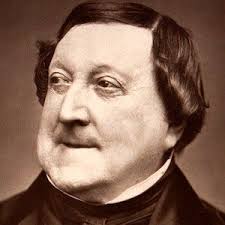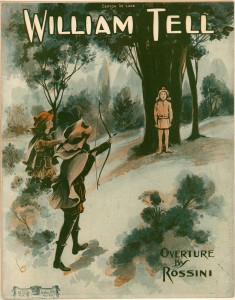 Rossini’s last opera, the four-act Guillaume Tell, with a composite French libretto based on Schiller’s play Wilhelm Tell, was produced at the Paris Opéra on 3 August 1829. However, within three performances the opera’s length of roughly four hours and difficult casting requirements necessitated some immediate cuts. In addition, the complex tale of the Swiss patriot William Tell and his famous bow and arrow during the Austrian occupation of Switzerland, raised a number of political concerns.
Rossini’s last opera, the four-act Guillaume Tell, with a composite French libretto based on Schiller’s play Wilhelm Tell, was produced at the Paris Opéra on 3 August 1829. However, within three performances the opera’s length of roughly four hours and difficult casting requirements necessitated some immediate cuts. In addition, the complex tale of the Swiss patriot William Tell and his famous bow and arrow during the Austrian occupation of Switzerland, raised a number of political concerns.

Rossini
 By 1831, Tell was abridged to three acts, with a new finale based partly on the concluding section of the famous overture. Further revisions produced a seemingly endless number of variants, and the four-act version was only restored at the Paris stage in 1856. When Rossini was asked about his compositional legacy, he replied, “Do you know what will survive me? The third act of Tell, the second act of Otello, and the Barber of Seville from one end to the other!”
By 1831, Tell was abridged to three acts, with a new finale based partly on the concluding section of the famous overture. Further revisions produced a seemingly endless number of variants, and the four-act version was only restored at the Paris stage in 1856. When Rossini was asked about his compositional legacy, he replied, “Do you know what will survive me? The third act of Tell, the second act of Otello, and the Barber of Seville from one end to the other!” 
William Tell statue at City Hall in Tell City, Indiana
Gioachino Rossini: Guillaume Tell
